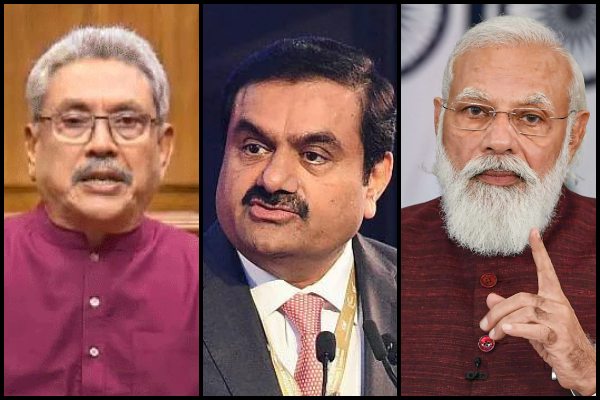Sri Lanka seeks G-to-G deal to legalize Adani project given without tender
By Nirupama Subramanian
CHENNAI – The Sri Lankan government wants to turn its 500-MW Adani wind power project agreement in the country’s North into a ‘government-to-government’” agreement in order to step around the legal difficulty of having given it to a private company without an open tendering process. This has raised concerns being openly expressed by legislators in Sri Lanka about whether Adani Green Energy Limited (India) has been accepted as the representative of the Indian government.
An English language weekly reported on Sunday (3) that a proposal in this regard was presented to the Sri Lankan cabinet by the power and energy minister Kanchana Wijesekera. The cabinet paper, quoted by the newspaper, lays out in detail the justification for considering the US$ 400 million Adani project as a ‘G-2-G’ project.
The cabinet paper notes that under the rules of the Electricity Act, an open competitive bidding process is a requirement for granting approval to private investment in power projects. But such a condition could be avoided “if the approval of the cabinet of ministers is granted to consider the proposal by Adani Green Energy Limited of India as a Government-to-Government Proposal,” the weekly quotes the cabinet paper as saying.
As the cabinet had already considered all aspects of the agreement between the government of Sri Lanka and Adani Green Energy Ltd and “authorized all the parties to enter into the said MoU and to proceed with the required future action”, the cabinet paper proposes that “it can be strongly justified to consider the said proposal of Adani Green Energy Limited of India under the category of Government-to-Government basis as required under the Electricity Act”.
The wind power deal has been mired in controversy from the start. It was signed in March 2022, six months after Gautam Adani visited Sri Lanka and met with the then president, Gotabaya Rajapaksa, in the midst of Sri Lanka’s economic meltdown, at a time the Rajapaksas had reached out to India for help.
In June 2022, the chairman of the Ceylon Electricity Board, M.M.C. Ferdinando, told a hearing of Committee On Public Enterprises (COPE) that President Rajapaksa had summoned him after a meeting in November 2021, and told him that the wind power project must be awarded to the Adani Group, and that this was the wish of Prime Minister Modi. Three days later, Ferdinando retracted the statement and resigned from CEB.
In an interview to The Hindu in April 2023, Sri Lankan foreign minister Ali Sabry conceded that the wind power project was a ‘government-to-government kind of project’. “We were keen on an Indian investor to come in, so who the Indian investor was for the Indian government and the authorities to decide and choose and send it to us.”
It is not clear how the Narendra Modi government will react to the latest developments as it has so far refused to react to Ferdinando’s retracted claim or the suggestion that it chose the Adani group for the lucrative deal.
Always a subject of political controversy, Narendra Modi’s proximity to Gautam Adani has become an even more sensitive subject in the wake of the Hindenburg report and recent allegations that his government chose to soft-pedal allegations of stock manipulation against the company.
The cabinet proposal was reportedly presented on August 14. On August 31, a Sri Lankan news portal reported that a parliamentarian had expressed concern at the move to give the project legitimacy via the G2G route, and asked if this meant the Adani company was a representative of the Indian government.
Charitha Herath, a dissenting parliamentarian of the Sri Lanka Podujana Peramuna (SLPP), the Rajapaksa-led party that supports President Ranil Wickremesinghe, said power project proposals are usually presented for approval under the provisions of the Sri Lanka Electricity Act.
“However, this new cabinet paper calls to consider the project as a government-to-government proposal. So, has Adani Green Energy Limited (India) been accepted as the representation (sic) of the Government of India? If the Indian government has accepted this, I have no reservation. I wish to know what the Attorney General’s interpretation of this is,” the MP said at a media briefing.
– thewire.in



Comments are closed, but trackbacks and pingbacks are open.